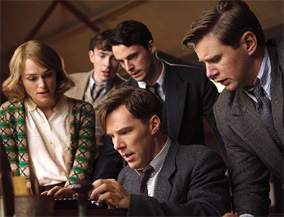|
|
They Shoot Oscar Prognosticators, Don’t They?The Toronto Film Festival—Part III: The Imitation Game Jumps Out AheadBy J. Don BirnamSeptember 22, 2014
And (semi spoiler alert) the worst part of all is the Eureka moment of the film - when Turing has the inspiration that allows him to finally crack Enigma. The trick is so obvious as to be visible the moment it is introduced in the plot about 45 minutes prior to the discovery, and so stupidly simple that anyone with a basic understanding of mathematics will spot it immediately when it is mentioned. Again, the filmmakers are probably wiser than I am - explaining to audiences the intricacies of these mathematical machinations is challenging enough as it is, and adding more to it would have probably made the movie more inaccessible to audiences. Given that this is a story that has to be told, it is always a conundrum to determine what the best approach is here. Does the filmmaker stick with the difficult scenes risking that it will turn audiences away, as it happened with 12 Years A Slave, or does the filmmaker turn it all into fluff and joy so as to draw audiences in, as the people behind Argo did? The Imitation Game people went for the latter choice. I can’t necessarily blame them, but I personally find that choice less rewarding than the former. All in all, however, The Imitation Game is a solid movie, one that I would gladly see again, and it will make a worthy Best Picture nominee (should it get there, as I expect it likely will). I would not give it the top prize. The Imitation Game is set to be released commercially in the United States on November 21st, the Friday before Thanksgiving.
|

|
|
|

|
Thursday, October 31, 2024
© 2024 Box Office Prophets, a division of One Of Us, Inc.


